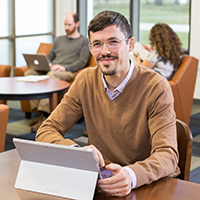By Mike Ludkovski
Since the first SIAM Conference on Financial Mathematics and Engineering (FME) in 2006, the conference has been growing by leaps and bounds at each and every subsequent meeting. This year, we once again expect to welcome a record number of speakers and attendees during the upcoming 2016 SIAM Conference on Financial Mathematics and Engineering (FM16), taking place in Austin, Texas, from November 17-19. Over the event’s three full days, an expected 300 participants will attend 200+ talks, 41 minisymposia, two minitutorials, and a poster session.
One reason for ongoing growth is that the field of financial mathematics/financial engineering continues to thrive and extend. Indeed, while the core topics of option pricing and optimal investment—which stood at the origin of FME 50 years ago—are still relevant, the community has been energized through numerous new research directions connecting to “pure” mathematics (nonlinear PDEs, optimal transport), statistics (nonparametric regression, machine learning), computational fields (simulation methods, uncertainty quantification), economics (market microstructure, behavioral risk-preferences), and policy-making (financial regulation, risk allocation). An underlying major shift has been the consideration of interacting systems of agents, either in terms of game-theoretic frameworks, stochastic equilibria, or network approaches.
The eight plenary talks at the 2016 SIAM Conference on FME (offer a glimpse of this remarkable breadth of topics. The opening talk by Sebastian Jaimungal will review the latest developments in algorithmic and high-frequency trading (HFT), which concerns analysis of trading and risk at the ultra-short millisecond timescale (at that scale, trading activity is a discrete tick-by-tick system, requiring a very different modeling toolkit than the usual "continuous" world). Sebastian recently co-authored a book on the subject, which may well become the counterpart of Michael Lewis' best-selling Flashboys among the Ph.D. students. HFT has become a white-hot topic in the last few years, with more than 25 talks at FM16 dedicated to its various aspects.
Stochastic control remains a focal point of FME research, but the field has expanded dramatically beyond its original scope. One direction of expansion is towards a renewed interest in stochastic games. On Friday, November 18th, Rene Aid, who until recently was an industrial researcher with Electricite de France, will present about the burgeoning field of principal-agent models, which address the question of how to make other people do precisely what you want them to (which all PhD advisors are sure to appreciate). Rene is a pioneer of applying FME methods within energy markets, which have emerged as an important sub-field of FME, and is involved in a half-dozen minisymposia at the conference. Two theory-oriented plenaries will feature (1) Gordan Zitkovic, who will discuss new results on backward stochastic differential equations, also in connection with stochastic games, and (2) Jianfeng Zhang, who will review developments in path-dependent PDEs, a new framework for pathwise control. The closing talk on Saturday, November 19th, by Steve Kou will again focus on dynamic control, but from the perspective of numerical algorithms.
Another trending topic in the field is financial bubbles, a theory that rigorizes ``irrational exuberance'' by explaining why financial prices might deviate from fundamentals, in part by making deep connections between bubbles and the concept of local martingales. This subject will be addressed in two different plenary presentations by Jose Scheinkman, an economist who has long worked at the interface of finance and mathematics, and Francesca Biagini, an expert in stochastic analysis and semimartingales.
A host of exciting new developments have recently been obtained in the emerging topic of martingale optimal transport and the broader area of model-free or "robust" methods, which center on the idea of pathwise, probability-measure-free optimality. These directions will be presented in Beatrice Acciaio’s plenary talk and in multiple minisymposia.
The following events will highlight some other thematic trends: a collection of minisymposia on systemic risk (encompassing stochastic networks, financial regulation, central clearing, and systemic risk measurement); multiple minisymposia on numerical methods (as well as a minitutorial by Mike Giles on adjoint methods in finance); and interdisciplinary sessions on subjects such as "Machine Learning for Finance," "Models and Strategies for Investment and Insurance," "Behavioral Finance and Economics," and "High-Frequency Financial Statistics."
Acknowledgments: Tim Leung, professor at the University of Washington and co-chair of SIAM FM16, contributed to this article.
 |
Mike Ludkovski is a professor of statistics and applied probability at the University of California Santa Barbara. Among his research interests are Monte Carlo techniques for optimal stopping/stochastic control, dynamic oligopolies in energy markets, and actuarial applications. He has been an officer of the SIAM Activity Group on Financial Mathematics and Engineering since 2011, most recently serving as the SIAG/FME Chair. Together with Tim Leung (Washington), he is co-chairing the SIAM FM16 Conference. |